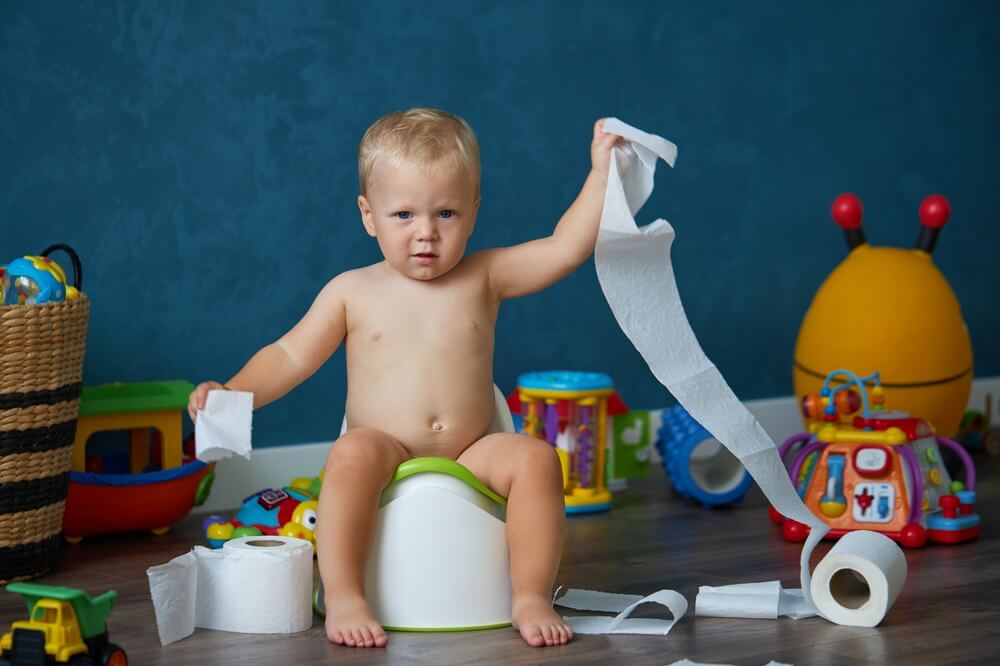6 Stages of Language Development in Kids (Plus FAQs!)
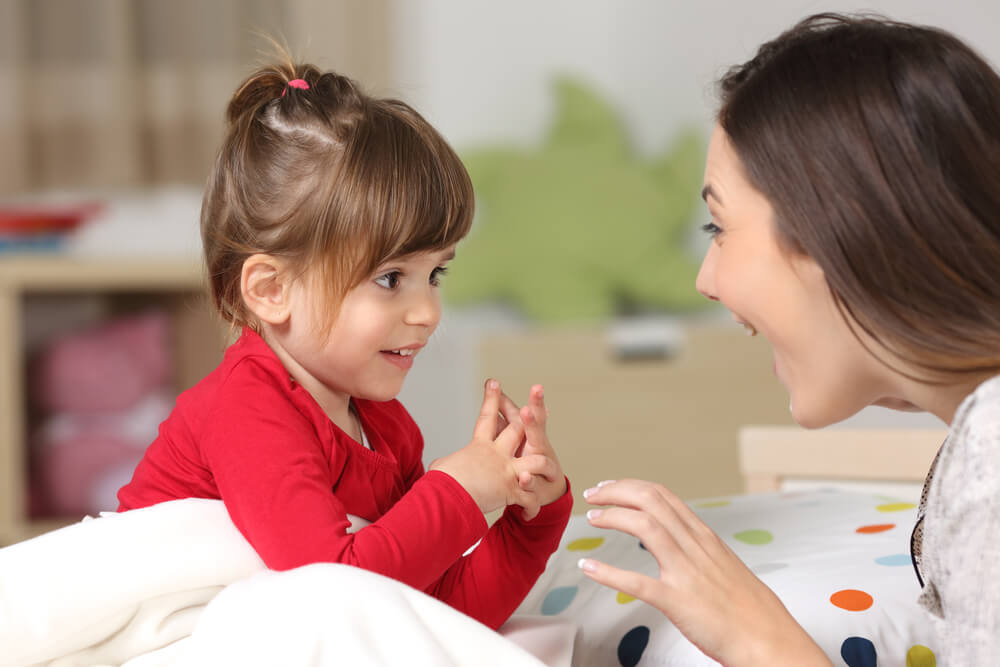
Have questions about your child’s verbal skills or language development? If so, you’ll want to educate yourself about the various stages of language development in children. Luckily, it’s a fascinating topic, and we’re here to help you unravel it. Let’s dig in.
Contents:
- What Is Language Development?
- Why Is Language Development Important?
- 6 Stages of Oral Language Development
- Tips for Improving Language Development
- FAQs
What Is Language Development?

fizkes/Shutterstock.com
Theories of language development—It sounds like a subject you might study in school. And if you were training to be a linguist or even a teacher, it would be! Language development, also known as language acquisition, is really just a normal part of growing up.
Still, it’s an intriguing process. Despite all of our research and careful observation, we still don’t know quite how it happens. Experts have their theories, though.
As you might guess, language development is the process by which young children learn to use language to communicate with others. Acquiring the skills necessary for effective communication is crucial to nearly all aspects of a child’s overall growth and well-being. Children learn to use language in different stages—it’s a complex process and it doesn’t all happen at once!
Why Is Language Development Important?
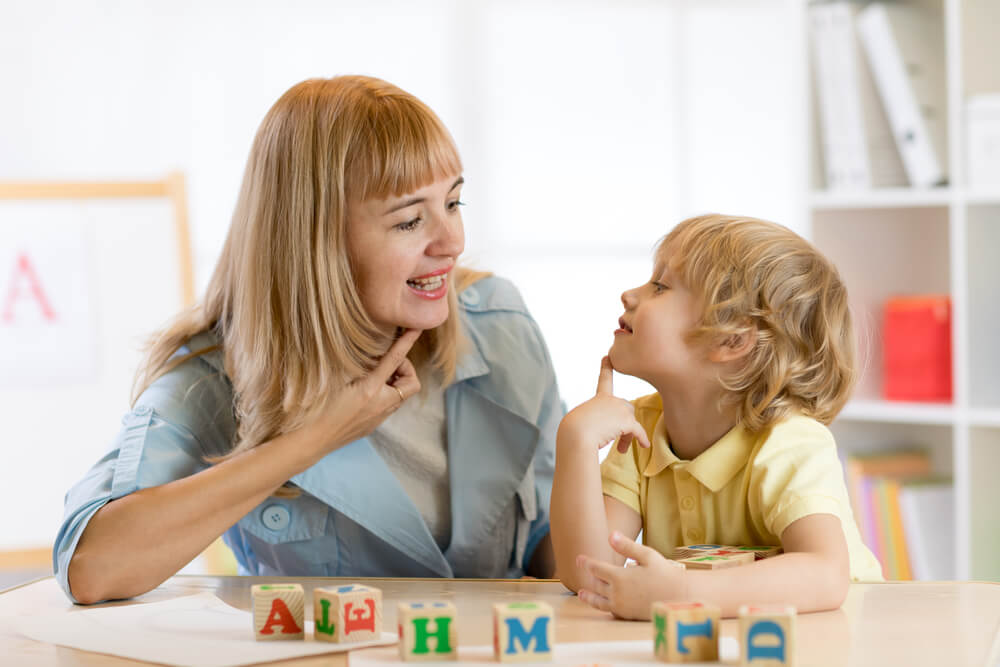
babbling stage/Shutterstock.com
Language development in children is indeed a natural process. Still, it’s something that parents and caregivers need to carefully monitor. That’s because language is such an important skill to have. Imagine what life would be like if you weren’t able to properly communicate your thoughts, desires, and needs to the people around you!
Language skills can have a huge impact on a person’s chances of success, happiness, and a fulfilling life. Being able to communicate can help them with social interaction, for example, as well as helping them learn more efficiently and fully from parents and teachers. Strong language skills, like continuous speech and understanding of universal grammar, are also linked with healthy cognitive development, and children who understand various aspects of languages well can find it easier to not only understand native languages but learn others, too. Plus, they’re less likely to struggle with language disorders.
6 Stages of Oral Language Development
In order to keep an eye on your child’s language acquisition, you’ll need to look for certain milestones. That’s where the various stages or levels of language development come in. It’s important for parents and caregivers to understand these developmental milestones related to language.
Let’s look at each of them in detail.
Prelinguistic Stage (Birth to 6 Months)
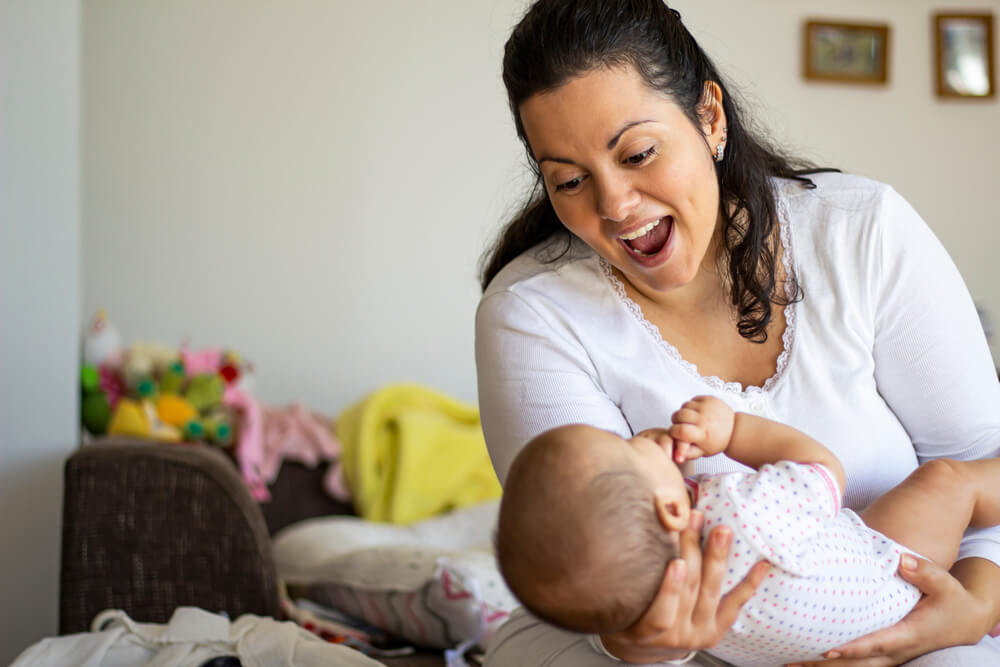
Marija Nedovic/Shutterstock.com
The first stage of language development in little ones is referred to as the prelinguistic stage. As the name suggests, this is the phase of development when an infant has yet to acquire language. During this time, babies rely on sounds instead of words to communicate.
If you’ve ever wondered why babies cry so much, this is the answer! Though they’ve yet to acquire formal language, even babies understand that sound is an important part of communicating. In a way, crying is baby’s first language.
Babbling Stage (6 to 9 Months)
At around six months, the sounds your baby is making will begin to mimic certain language patterns. We refer to this as the babbling stage.
During this phase, children begin to acquire some linguistic skills, and their mouths are growing to accommodate even more language abilities. Babies are beginning to understand that there’s more to communication than just crying!
Holophrastic Stage (9 to 18 Months)
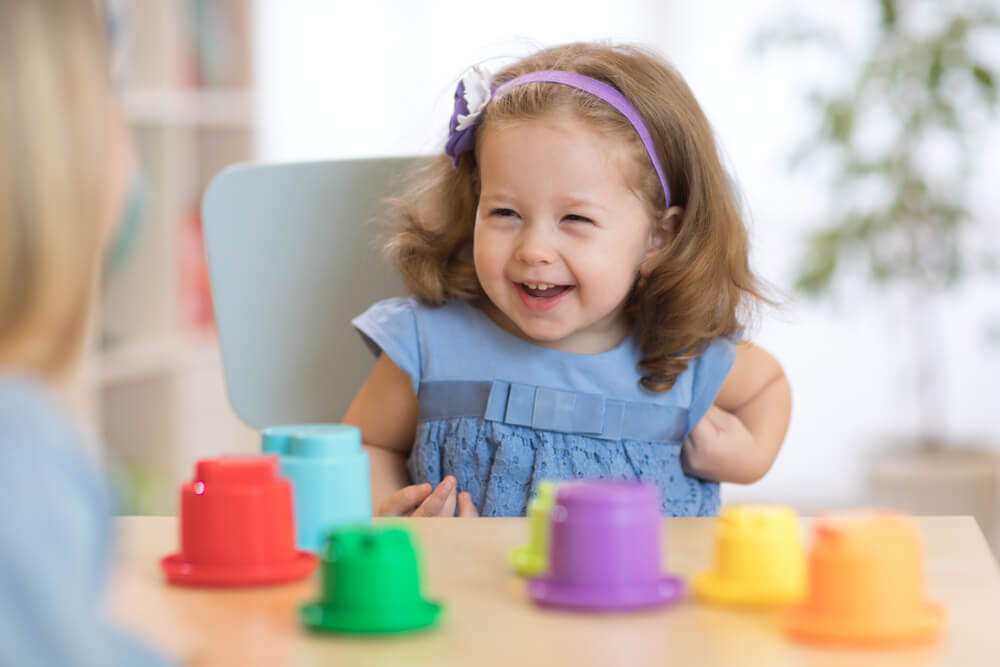
Oksana Kuzmina/Shutterstock.com
Around the age of 9 to 18 months, children have usually uttered their very first word. This is perhaps the most exciting stage of language development for parents! Throughout this stage, youngsters will begin using single words to communicate needs and wants.
Two-Word Stage (18 to 24 Months)
After kids get the hang of using single words, they soon progress to the two-word stage of language development. Often, children will begin combining some of the words they learned in the previous stage to communicate more effectively. This is a sign that their cognitive and verbal skills are growing!
Telegraphic Stage (24 to 30 Months)

Katerina Morozova/Shutterstock.com
During the telegraphic stage of language development, children move from using single words and phrases to communicating in sentences. Grammar will still be lacking in this phase, but little ones have learned to express an entire idea verbally and get their point across quite well! A typical sentence may sound something like, “Mama no go.”
Multi-Word Stage (30+ Months)
The final stage of language development in toddlers is called the multi-word stage. During this period, early learners will begin adding more and more words to their vocabulary. At this stage, your child’s brain is like a sponge, so he or she will be absorbing words at lightning speed!
The multi-word stage of child development paves the way to higher order language development. As your child grows, he or she will be able to understand the relationships between various words in a sentence. Eventually, your little one will go from speaking and listening to reading and writing more complicated sentences.
Tips for Improving Language Development

Monkey Business Images/Shutterstock.com
In healthy children, language development is something that occurs quite naturally. Still, there are some things you can do to help move things along in the right direction. And it doesn’t have to be an elaborate game or structured activity. There are simple techniques you can integrate into your daily routine that are just as effective.
Talk to Your Baby
It may sound silly, but it’s critical to engage your little one in conversation long before he or she is able to reply as a form of social learning. Even before children can speak a word, they’re learning the nuances of conversation. This includes not only how to talk, but the rhythm of language as well as important social skills like eye contact and body language.
Even though they’re not engaging in continuous speech or figuring out the rules of universal grammar, young children are still undergoing rapid cognitive development and can learn a lot from their parents’ faces and vocal sounds. Just remember to use child-directed speech, with simple words, receptive language, and nothing too complex.
Read, Read, and Then Read Some More

Prostock-studio/Shutterstock.com
We hear it all the time—the most important thing you can do to encourage literacy and language skills in children and raise a top-of-the-class infant is to read to them often. It’s become quite the cliché, but that’s because it’s true. There is no replacement for frequent reading, so make it a part of your child’s daily routine, no matter their age.
Fortunately, children love books. You can even let them choose their own titles to explore. At this stage, there are few rules when it comes to selecting books. Even picture books will do the trick as long as you’re talking with your child about the images on the page.
Language Activities for Preschoolers
Don’t wait for your child to enter school to expose them to language-related activities. We often associate word games with preschool, but parents and caregivers can begin introducing these activities early on for the best results.
There is no shortage of language and child-directed speech activities that parents and their preschoolers can engage in. After all, language is a part of nearly everything we do. Still, we’ll suggest some particularly fun and effective activities below:
- Storytelling—You don’t need a book to tell a great story. As your child grows, ask them to contribute to the plot!
- Coloring and Drawing—Kids love to get creative with crafts. To add a language component to the activity, talk to your little one about the illustrations on the page. Give characters names and personality traits to extend the fun and learning!
- Music and Dance—Choose some age-appropriate songs to have your child sing and dance along to. Movement and learning go hand in hand!
FAQs
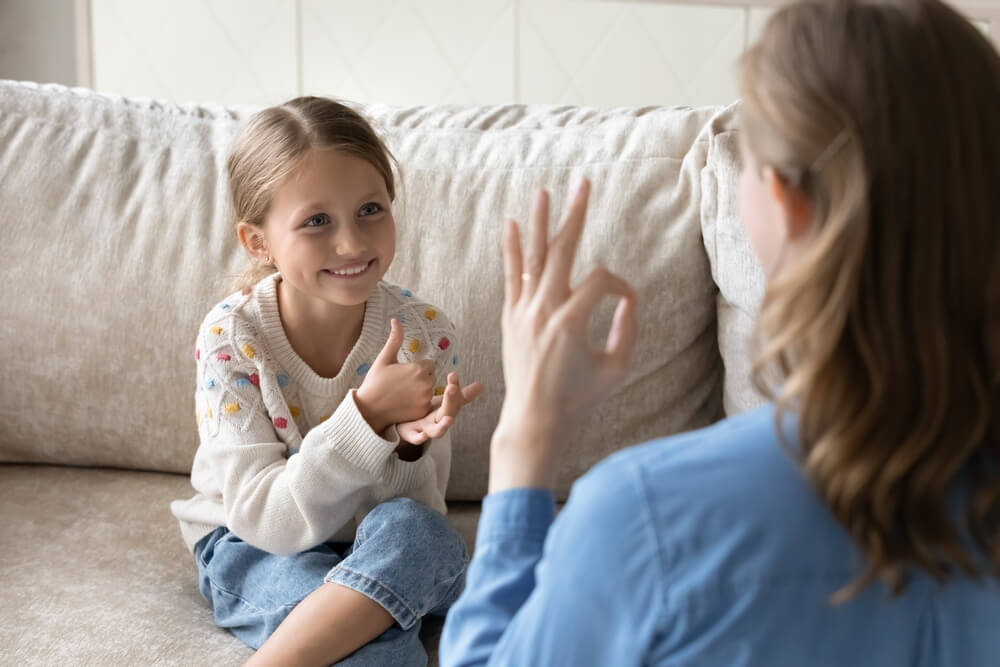
fizkes/Shutterstock.com
It’s also normal to have questions about your child’s language acquisition and development. Even if this isn’t your first child, you may still find yourself with concerns since every kid is different when it comes to learning speech. Take a moment to review the frequently-asked questions below to learn more about critical issues in language development amongst children.
What should I do if my child is lagging behind with language development?
First, don’t panic. Kids are individuals. They tend to acquire language at their own pace, despite our guidelines and expectations. If you’re concerned about developmental phases, it’s best to speak to your pediatrician. In the meantime, keep engaging your little one in conversation and language-related activities like reading!
Is it up to me to teach my youngster to speak?
No. Contrary to popular belief, children don’t need to be taught language. Instead, language acquisition is a natural process. Still, there are some things you can do to support your little one’s language development. These include reading, playing games, and engaging your child in conversation regularly.
Do girls develop language before boys?
On average, yes. Girls do tend to hit developmental milestones related to language before boys. This accelerated pace has been linked to certain neurological differences.
Can children learn two languages at once?
Yes. according to the Linguistic Society of America, young children can learn two languages simultaneously (e.g., English and Spanish) just as easily as they can learn one.
Should I use “baby talk” when I speak to my child?
Yes. Some people think children acquire language faster if they’re spoken to like they’re adults. This is a misconception, though. Baby talk uses more simplistic patterns and tends to be slower than regular speech. These characteristics make it easier for children to learn.
What are the 5 components of language development?
The five key components of language skills are phonology, morphology, syntax, semantics, and pragmatics.
- Phonology is about understanding the structure of speech and basic rules of pronunciation.
- Morphology is about understanding small words and building blocks of human language. It’s one of the most important language developmental stages.
- Syntax is about being able to combine words to form a simple sentence.
- Semantics is about understanding language environments context, idioms, and more expressive language.
- Finally, pragmatics is about using different language varieties and grammatical structures in different settings or social contexts.
What are examples of language development?
Examples of language development in infants may include non-verbal communication, as well as babbling, which is one of the earliest forms of speech development (often around four to six months of age). As the child grows and language learning improves, they can achieve new developmental stages, like saying simple speech sounds, forming basic phrases, and eventually building to complex sentences and grammatical structures.
What are the main stages of language development?
There are six general stages of language development: prelinguistic (using sounds to communicate), babbling (between six and nine months of age, on average, in which babies begin to form their own unique word-like sounds), holophrastic (learning their first words), two-word (combining words), telegraphic (conveying ideas or making basic sentences), and multi-word (using multiple words to form more complex sentences).
Learning Language Is a Life-Long Endeavor
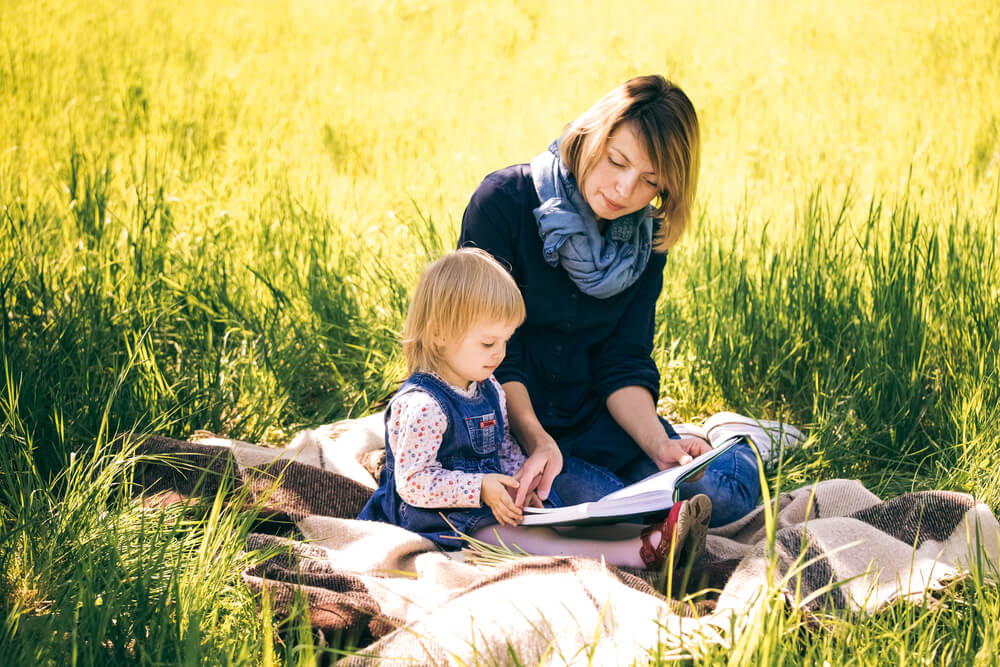
Andrii Oleksiienko/Shutterstock.com
While acquiring language is a natural process, it’s also one that lasts a lifetime. We never stop learning about our language. As soon as we think we’ve mastered it, it evolves. And this happens over and over again throughout our lifetime!
As you help your little one learn the verbal skills he or she needs to navigate childhood, it’s important to remember that you’re witnessing the very early stages of language development. You should expect plenty of mistakes and some setbacks as well. Be sensitive to the fact that this is all a normal part of the process!
The picture on the front page: Antonio Guillem/Shutterstock.com
Проверьте электронный ящик
















